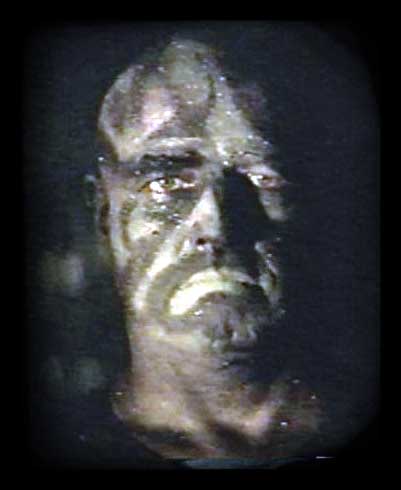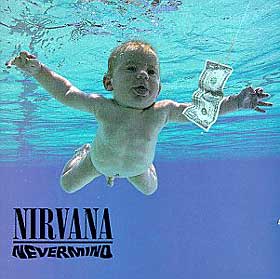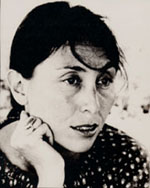December 20, 2004
TOO MANY POETS, TOO FEW NURSES

The father's law: 'don't touch your mother.'
The mother's law: 'don't play in the tombs.'
Land, 'No Future'
Matricide too is necessary.
Killing the Father might not be as easy as it looks, if only because the Father is the always-already dead god, zombie despot-deity who acquires power only on the presupposition of his own absence. Freud's analysis of this process in 'Moses and Monotheism' remains exemplary, and Lacan only draws the consequence of it in his 'The Death of God'. The absent God of Jewish Monotheism is nothing other than the guilt that the apes of the primal horde feel for killing the Father-Master, he who has the sovereign right to total enjoyment.

Coiled plexes of phantasm: is the Primal Horde of jealous Beta-Male monkeys itself only a phantasm, the back-projected ur-narrative cooked up to retrospectively make sense of the miraculated appearance ('it comes like lightning') of the big Other? Or does the fantasy of the violent parricide of Master Monkey Pere Jouissance belong to these primate slave moralists, these fuming resentful manimals, hot with angry blood? Or, was there no fantasy at all, in other words: did it 'really' happen?
A conundrum as old as psychoanalysis. (Psychoanalysis is that conundrum.) Did it happen or did you remember it happening only because you wanted it to happen?
The death of God gets rerun so many times in the postmodern Gothic: Marlow-Willard coming to terminate Kurtz, Roy Batty at the apex of the High Castle crushing Tyrell's eyes
(so THAT'S Anti-Oedipus!)

Or so we are led to believe. In fact, the violent destruction of the Father is Oedipalism itself, obviously. If you are not to repeat Oedipus (reversed-Kronos - the son who kills and consumes his father), you must do as St Paul recommends and 'kill death'. Kill death, don't do the work of death for it by taking the place of the dead father.
Because the Father, remember, is nothing other than the traces left after his own dismemberment; the voices in your head, the revulsions and disgusts garrisoned in your body (What exactly is it that makes you recoil in horror? [Theweleit].) The mortification of your body without organs. Nietzsche says that it us who have killed God (even though we aren't aware of it); but really it would be better to say that God's death is something done to us. Or: in order to become speaking animals we must be the mortified children of a dead God.
So now that Daddy's dead, are we free to return to the mother, return to what seems to precede death, to the maternal body that was our 'first home and dwelling place' (Freud)?
No, because the Father's No only ever pretended to be a moral Law, when really it was a Transcendental code line. 'Do not touch your mother' really meant 'You cannot return to the maternal body.' The Father was only ever the caretaker, because, as every One has always known, this is the most impossible of impossible journeys and that, dream of it as you might, you could never return to that place where you, in any case, never were - and this voiding of identity, this suspension of separation in the amnion is precisely its appeal. But the way is barred, absolutely (with flaming swords, so we are told in Genesis).
Not that this prevents any amount of blood being spilled in the grotesque attempt to recover that dwelling place (and also: to deny that this is what you want). Motherlands are at least as dangerous as Fatherlands.

What Oedipus wants, really, is neither sex nor the death of his father. The Oedipus complex is only the fantasmatic dramaturgy that plays out the drive for (re)Unification at the level of simpersonality. Laius is what His Majesty the Ego must imagine blocks his way back to the Garden of Delights (G.O.D.) the entrance to which seems to be the maternal body.
Kurt Cobain wasn't the first nor will he be the last male who blows his brains out to go in utero. Denial of self, erasure of identity, auto-annihilation: think of all the male violence/ malevolence that arises from the sick lethewards lure of this bucolic Imaginary. He wants to be what God says he is: One.

'When Dostoyevsky's Kirilov commits suicide, it's to prove that his will is stonger than God's. By proving thus that the human I possesses supreme power, he believes that he is emancipating man by putting him in the place of God. ('If I kill myself I become God' - 'God is a neccessity and therefore He must exist.')
Something entirely different is at stake in [Maria] Tsvetaieva's suicide: not to be that is, in the final instance, to be God, to dissolve being itself, to free it of the Word, of God, of self. 'I don't want to die. I want not to be.' That is what she says in her notes.
In an analogous situation a man can imagine an all-powerful though always insignificant mother, to 'legitimize' himself, to make himself known, to lean on her and be guided by her through the social labyrinth, though not without his own running ironic commentary. Mery-Laurent for Mallarme, Madame Strauss for 'little Marcel', Miss Weaver for Joyce, the series of fiancees taken and rejected by Kafka. .... For a woman, as soon as the father's not calling the dance and language is being torn apart by rhythm, no mother can serve as an axis for the sacred or the farce. The girl tries herself: the result is so-called female homosexuality, identification with men, or a tight reign on the least pre-Oedipal pleasure. And if no paternal 'legitimation' comes along to dam up the inexhaustible non-symbolized impulse, she collapses into psychosis or suicide.'
- Kristeva, 'About Chinese Women'
(btw: given all that was said above, isn't it clear now why Kristeva's investment in the pre-Oedipal is the most Oedipal of errors? Because Oedipus is nothing other than the fantasy that there is a 'pre-Oedipal'. And because, as Kristeva herself recognizes, 'The symbolic order - the order of verbal communication, the primal order of descent - is a temporal order.' And what is the 'pre-' if not a temporal designation?)
In any case, what 'artistic' men, those who quite literally turn self-destruction into an art form, can always have relied upon is the Mother figure who protects and nurtures them. The assumption being that self-destruction (and self-destruction is fascism on the micro-scale, just as fascism is self-destruction on a macro-scale) is justifiable because something else More Important than joys and sadnesses is at stake.
There is no more dangerous assumption than this. The 'aestheticization of politics' (Benjamin) or the erasure of politics by aesthetics ('so what if he is fascist, at least he wrote good poems') are the twin engines of the Fascist Art Machine, which, alongside its allies in the RCC and the Family, has done more to legitimate suffering and abuse than anything else on the planet.
The alternative is a construction, in no sense a recovery, of the body without organs, which in any case you have never lacked ('any way, you already have one'). It is about discovering-constructing your true Gnostic Self, which has nothing to do with the fake familial personality Alien Parasite Entity that confuses itself with you (and convinces you that its usurpation is nothing of the sort). The BwO, by contrast, is radically orphaned, it has 'no pappamummy' (Artaud), it is wherever you are not.
Practically, this requires, then, not more Mothers, - Mother love is biofascism (my child/ren uber alles) - still less male Mothers, but an impersonal Affectionate Collectivity. Nurses are more impersonal than swooning poets, oblivated drug-users or cosmos-communers. Only agape can dissolve persons, families and nations.
Posted by mark at December 20, 2004 04:02 PM | TrackBack